Political Report
How the Manhattan DA Election May Rock the City’s Criminal Justice Status-Quo
Thirteen policy questions reveal the rifts in tomorrow’s Democratic primary, and the space for criminal justice reforms.

Thirteen policy questions reveal the rifts in tomorrow’s Democratic primary, and the space for criminal justice reforms.
On Tuesday, a year after the protests over policing that rocked New York City, voters in Manhattan will set the future of the borough’s criminal legal system. In the shadow of the mayoral election, eight candidates are running for Manhattan district attorney in the Democratic primary, and some are proposing major breaks with the departing incumbent.
Cy Vance, who has faced criticism from local activists for policies that they say are too punitive and insufficiently committed to police oversight, is not seeking re-election. And those who are running instead are laying out very different proposals for how they would replace him.
The Appeal: Political Report parnered with New York Focus to produce a five-part series reported by Sam Mellins on the Democratic primary focusing on key issues that the next DA will confront and on the contrasts among the eight contenders. Issues range from police oversight to drug policy. The series is summarized here, in advance of the primary.
In this staunchly blue jurisdiction, the winner of the Democratic primary will be all but assured to win the election in November.
Police oversight: How will the next DA respond to police misconduct?
In the wake of last summer’s protests against police brutality, DA candidates have been pushed to rein in police misconduct and sideline officers who have lied. “The police can only go as far as the DA lets them,” Legal Aid attorney Rigodis Appling said. “Prosecutors can reform police.”
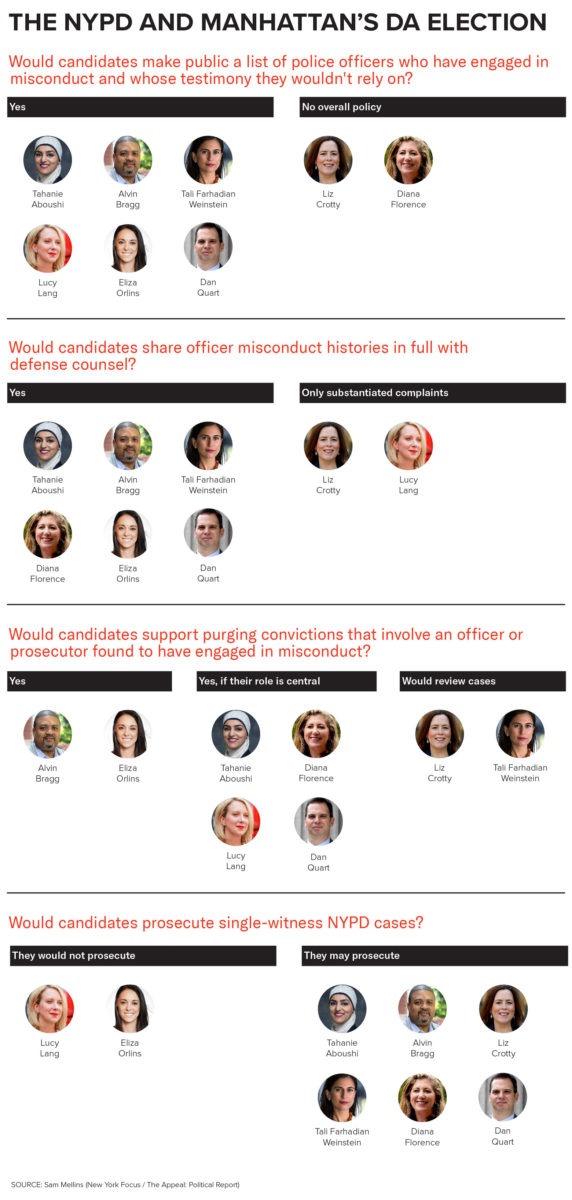
Six candidates pledged to publicize a list of officers whose testimony they would not rely on and to share officer misconduct records in full. Only Lucy Lang and Eliza Orlins said they would not prosecute single-witness NYPD cases. On commitments to purge convictions involving officers found to have engaged in misconduct, Alvin Bragg and Orlins went the furthest, while only Tali Farhadian Weinstein and Liz Crotty made no blanket commitments.
Read more (June 2021): On NYPD oversight, Manhattan’s DA candidates are split
Life sentences: Will the next DA shorten prison terms?
Around 8,000 New Yorkers are in prison for life, 80 percent of them Black or Latinx. Amid a national reckoning with excessive sentencing practices, advocates and scholars point to the many mechanisms available to prosecutors to bring down incarceration by avoiding the harshest sentences and boosting parole opportunities.
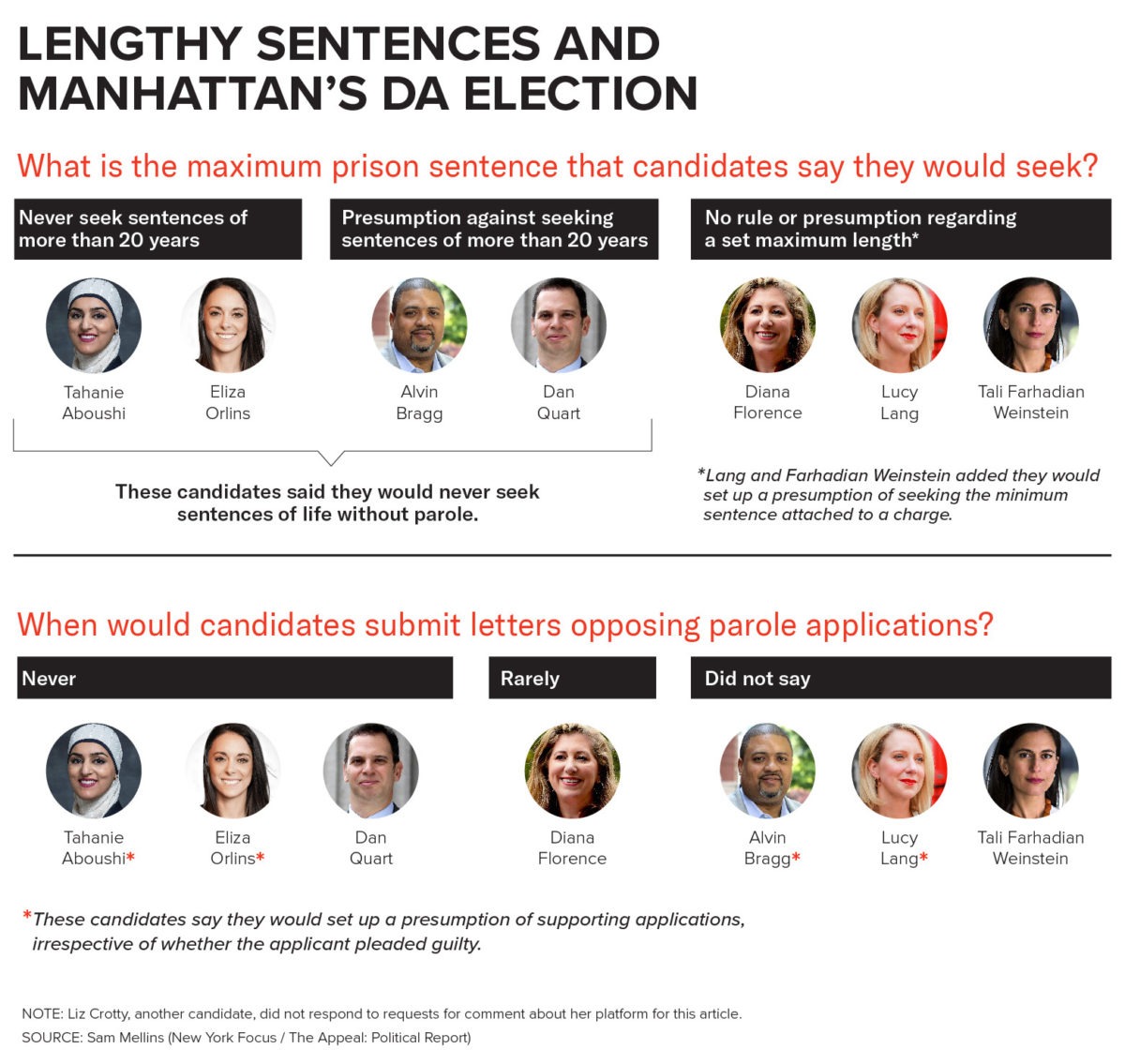
Tahanie Aboushi, Bragg, Orlins, and Dan Quart all said they would never seek sentences of life without parole and would either never seek sentences above 20 years, or would have a presumption against it. Aboushi, Orlins, and Quart said they would never oppose parole applications, as the current DA frequently does. And other candidates, including Lang and Bragg, said they would actively support such applications more often.
Read more (April 2021): Some Manhattan DA Candidates Draw a Line Against Life in Prison Sentences
Sex work: Will the next DA advance decriminalization?
New York has been on a trajectory of expanding sex workers’ rights, and the next Manhattan DA will decide whether to continue toward decriminalizing sex work.
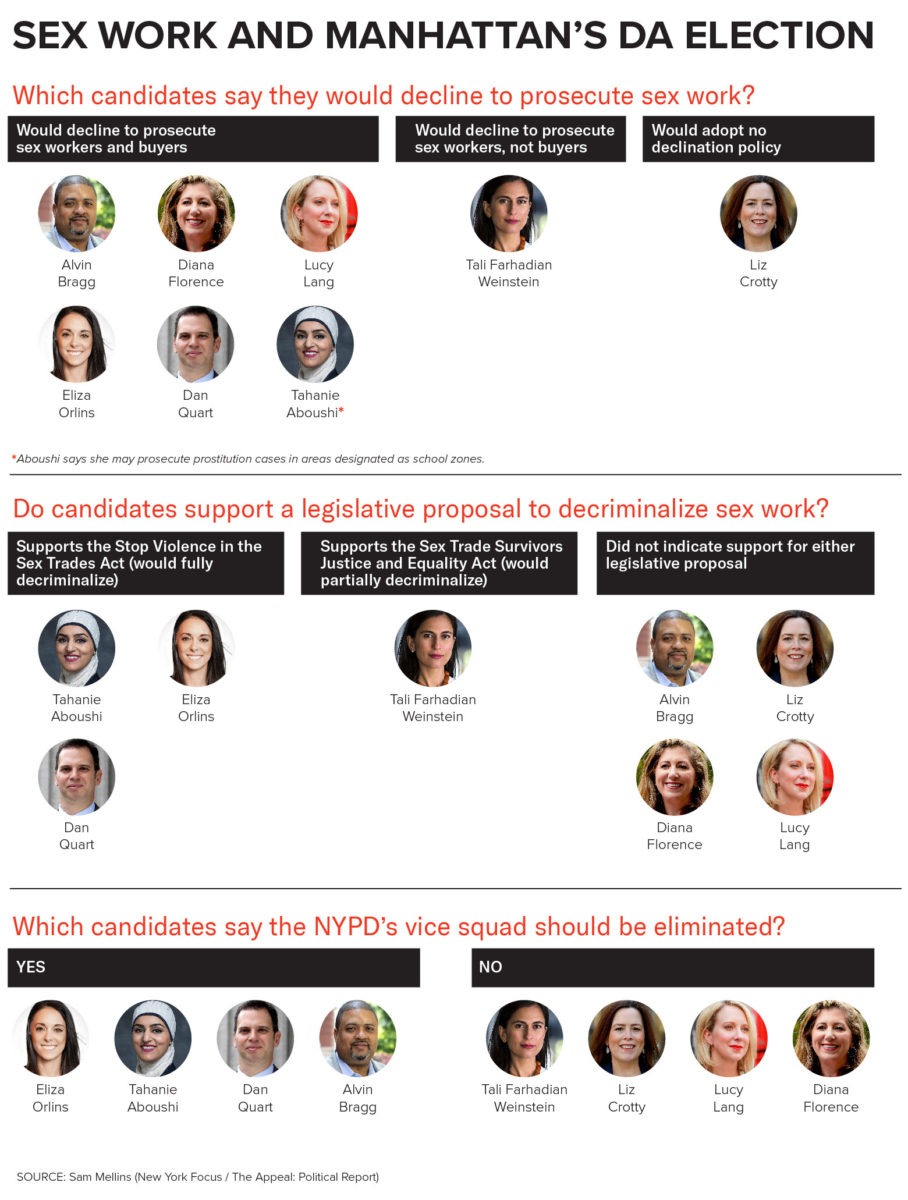
All candidates except Farhadian Weinstein and Crotty said they would stop prosecuting sex workers or buyers; Farhadian Weinstein said she would prosecute buyers but not sellers. Candidates split on their support for state-level legislation to decriminalize sex work, as well as on whether they support eliminating a controversial NYPD division heavily involved in policing sex work. (The month after the article cited below was published, Vance announced he would stop prosecuting sex workers.)
Read more (March 2021): In Manhattan DA Race, Momentum Builds to Decriminalize Sex Work
Statewide advocacy: Will the next DA remain in New York’s DA Association?
New York’s DA association has long been a powerful tool with which the state’s prosecutors have fought criminal justice reform proposals. Similar dynamics in other states have recently led reform-minded DAs to quit their associations. Will Manhattan’s next DA follow suit?
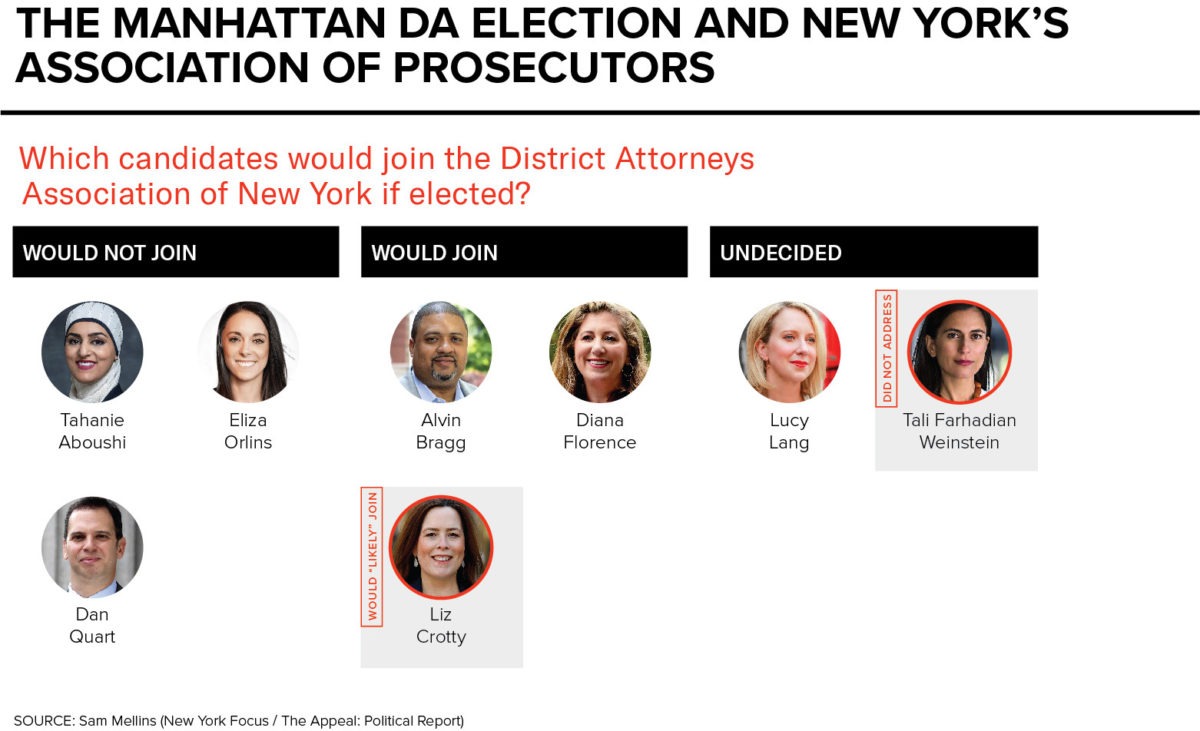
Three progressive candidates said they would leave the statewide DA association, which could undercut its ability to speak on behalf of all prosecutors. All but one candidate said they would be interested in joining or forming a progressive prosecutors association, even if they also stayed in the current association.
Read more (Feb. 2021): Will Manhattan’s Next DA Break Ranks With Tough-on-Crime Colleagues?
War on drugs: How will the next DA address the Special Narcotics Prosecutor?
New York City is home to a little-known office of over a hundred attorneys who solely prosecute drug crime. A remnant of Governor Nelson Rockerfeller’s war on drugs in the 1970s and the only prosecutor’s office of its kind, the office of the Special Narcotics Prosecutor has garnered more attention after multiple DA candidates pledged to severely curtail its powers.
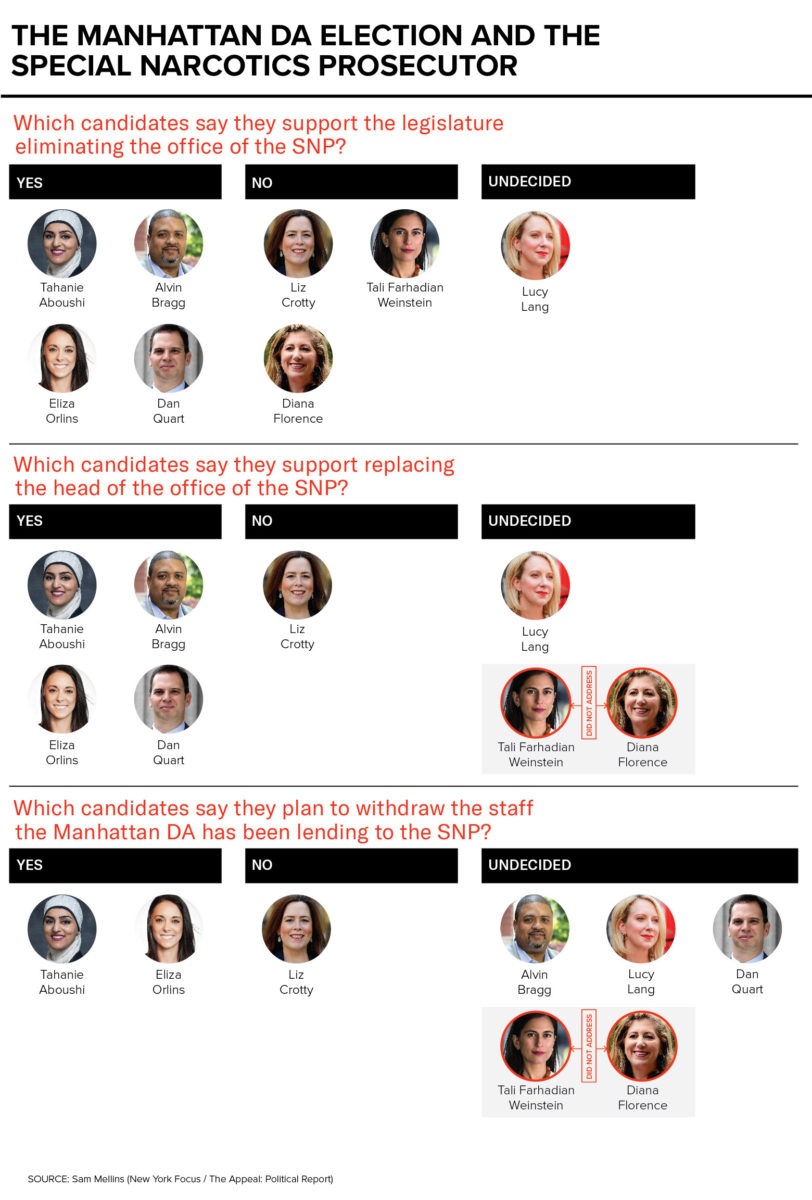
Aboushi, Bragg, Orlins and Quart said they support the state legislature eliminating the office and they would vote to replace Bridget Brennan, the tough-on-crime head of the office, which would require the votes of three of the five borough DAs. Aboushi and Orlins said they would unilaterally withdraw the staff that the Manhattan DA lends to the office; after the article cited below was published, they were joined by Quart, who had initially said he was undecided.
Read more (Dec. 2020): The Election That Could Thwart New York City’s War on Drugs
